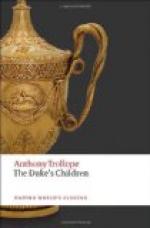But though the story was so far good, he had at moments been imprudent, and had talked when he should have been silent. The whole matter had been a torment to him. In the first place his conscience made him miserable. As long as it had been possible to prevent the evil he had hoped to make a clean breast of it to Lord Silverbridge. Up to this period of his life everything had been ‘square’ with him. He had betted ‘square’, and had ridden ‘square’, and had run horses ‘square’. He had taken a pride in this, as though it had been a great virtue. It was not without great inward grief that he had deprived himself of the consolations of those reflections! But when he had approached his noble partner, his noble partner snubbed him at every turn,—and he did the deed.
His reward was to be three thousand pounds,—and he got his money. The money was very much to him,—would perhaps have been almost enough to comfort him in his misery, had not those other rascals got so much more. When he heard that the groom’s fee was higher than his own, it almost broke his heart. Green and Villiers, men of infinitely lower standing,—men at whom the Beargarden would not have looked,—had absolutely netted fortunes on which they could live in comfort. No doubt they had run away while Tifto still stood his ground,—but he soon began to doubt whether to have run away with twenty thousand pounds was not better than to remain with such small plunder as had fallen to his lot, among such faces as those which now looked upon him! Then when he had drunk a few glasses of whisky-and-water, he said something very foolish as to his power of punishing that swindler Green.
An attempt had been made to induce Silverbridge to delay the payment of his bets;—but he had been very eager that they should be paid. Under the joint auspices of Mr Lupton and Mr Moreton the horses were sold, and the establishment was annihilated,—with considerable loss, but with great despatch. The Duke had been urgent. The Jockey Club, and the racing world, and the horsey fraternity generally, might do what seemed to them good,—so that Silverbridge was extricated from the matter. Silverbridge was extricated,—and the Duke cared nothing for the rest.
But Silverbridge could not get out of the mess quite so easily as his father wished. Two questions arose about Major Tifto, outside the racing world, but within the domain of the world of sport and pleasure generally, as to one of which it was impossible that Silverbridge should not express an opinion. The first question had reference to the mastership of the Runnymede hounds. In this our young friend was not bound to concern himself. The other affected the Beargarden Club; and as Lord Silverbridge had introduced the Major, he could hardly forbear from the expression of an opinion.




